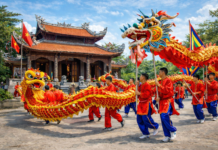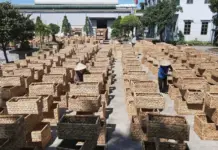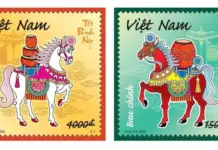Born in 1989, Vang Cheo Cho is one of the few young H’mong people to receive a formal education and start a business to escape poverty. After graduating from high school, he studied at the College of Economy and Tourism in Lao Cai Province. He also attended a two-year training course for tour guides and studied Chinese and English.
Cho said that many H’mong youngsters in Bac Ha District want to use the power of knowledge to escape poverty.
In 2012, Cho started working as a tour guide accompanying visitors from Hanoi to tourist attractions in his hometown in Lao Cai Province, such as Sapa and Bac Ha. He observed that his foreign customers were showing great interest in exploring the land, people, culture and customs of Vietnam’s mountainous region, which motivated him to open a tourist accommodation.
From his savings after four years of working as a tour guide, he started to turn his dream into reality in 2016. He said he wanted to open a homestay so that foreigners could live in a local’s house and get a deeper look into the life and culture there.
Cho’s homestay was built as a stilt house using natural material.
The VND1.7 billion homestay was built as a stilt house using natural materials such as bamboo, rattan, and palm leaves. It has nearly ten rooms, each equipped with basic amenities for guests. The house is decorated with daily utensils and pieces of brocade cloth.
The house is warm in winter and cool in summer. As it is located in the mountainous region, guests may even have to cover themselves with a blanket in summer nights.
At the beginning, Cho advertised his homestay through booking websites including agoda, booking.com and Airbnb. In March 2017, when it became operational, “Cho and Family Homestay” welcomed its first visitors, a Spanish family who made their reservation via booking.com.
In 2018, Cho decided to upgrade and expand his homestay to serve an increasing number of visitors.
A tourist picks vegetables from Cho’s garden.
While staying at “Cho and Family Homestay”, guests are treated as if they are at their home, they are invited to have meals and cook with the host or pick vegetables and fruits from the house’s garden.
Cho’s homestay has created jobs for five family members, who help to clean rooms, cook, and welcome guests.
As Bac Ha has become more popular among tourists, Cho’s homestay has welcomed more guests, particularly during the district’s festivals, horse race events, and plum flower season.
He has attended training courses hosted by the Centre for Rural Economy Development (CRED), which have helped him to run his homestay more effectively and professionally. He also joined English classes and cooking classes to improve the quality of his services for customers.
Tourists enjoy breakfast at Cho’s homestay.


.jpg)

.jpg)


